Gansu Province is one of the regions with a large number of ethnic minorities. There are many ethnic minorities living in Gansu Province, including Hui, Tibetan, Dongxiang, Tu, Mongolian, Yugur, Salar and Bao 'an. These ethnic minorities have formed unique cultural traditions and living customs in history, adding rich colors to the diverse culture of Gansu.
Hui
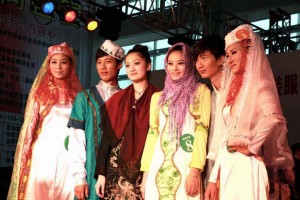 The Hui Nationality
The Hui Nationality
The Hui ethnic group is a minority group with a large population in China, mainly distributed in the Ningxia Hui Autonomous Region, which has a population of 1,862,500, accounting for 18.9% of the total Hui population in China. In Gansu, they mainly live in Gannan, Dingxi, Linxia, and other places. Chinese is commonly used by the Hui people today, with different dialects in different places. The Hui people are believers in Islam. Most of their ancestors were Han people in northern China. They gradually converted to Islam due to the influence of Mongolian, Turkic, and other ethnic groups, and they followed Islamic food taboos and etiquette rules, such as the prohibition of eating pork. The Hui people are known for their diligence, intelligence, and kindness. They have rich experience and skills in agriculture, animal husbandry, handicrafts, and other fields.
Major Festival: Eid al-Fitr (开斋节), Eid al-Adha (古尔邦节)
Tibetan
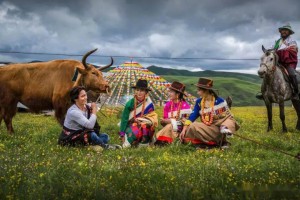 The Zang Nationality
The Zang Nationality
Tibetans are mainly distributed in Tibet, and the Tibetans in Gansu live in Gannan Tibetan Autonomous Prefecture. Tibetans have their written language. Tibetans are an integral part of China's history. It is found that their ancestors lived in the Yarlung Zangbo River basin 4,000 years ago, making them one of the oldest ethnic groups in China and South Asia. It has a long history and unique cultural traditions. Tibetans generally believe in the Tibetan religion. Concerning the Dalai Lama, Tibetan Buddhism has a profound influence in Tibetan areas. Tibetans pay great attention to etiquette in daily life, and they will bow to their elders when they see them. The Tibetan people are also very hospitable, and the highest etiquette for them to receive guests is to offer Hada, indicating a warm welcome and sincere respect for the guests. Hada means gauze or silk scarf in Tibetan. Hada is mainly white, and colorful hada is used in the most solemn ceremonies.
Major Festival: Sho Dun Festival (雪顿节), Rogation day (祈祷节)
Dongxiang
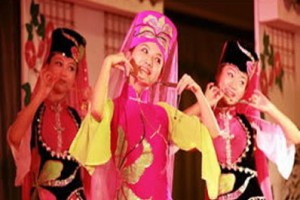 The Dong Xiang
The Dong Xiang
Dongxiang is a unique ethnic group in Gansu Province, mainly distributed in Linxia Hui Autonomous Prefecture. They do not have their language, and most of the Dongxiang people are also able to speak Chinese, Chinese is the common language of Dongxiang people. According to the 2021 population statistics, the Dongxiang population in China is 774,947. They are similar to the Hui in terms of living customs and religious beliefs, and they also believe in Islam. Dongxiang mainly to wheat, beans, highland barley and other pasta and potato as the staple food, avoid eating pig, dog, horse, donkey and other meat.
Major Festival: Eid al-Fitr (开斋节), Eid al-Adha (古尔邦节), Christadelphia (圣纪节), The Azurah Festival (阿守拉节)
Tu
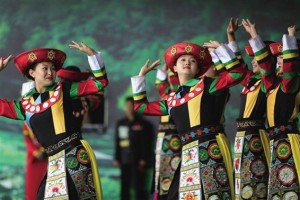 The Tu Nationality
The Tu Nationality
The Tu ethnic group is one of the smaller ethnic groups in China, with a total population of 281,928 people according to the 2021 population statistics. In 1979, the state created for the Tu people a local script based on the Latin alphabet and in the form of the Chinese Pinyin alphabet. Tu people are good at making wine, which to brew Qingke wine civilization. There is a saying among the Turkish people, "The guest is coming, the blessing is coming." and they treat the guests grandly.
Major Festival: Tu ethnic Arena Meeting (擂台会), The Damma Show (丹麻戏会), Na Dun (纳顿)
Yugu
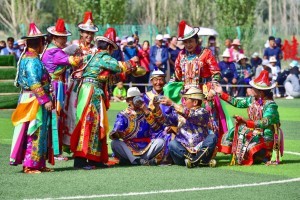 The Yugu Nationality
The Yugu Nationality
Yugu people live at the foot of the Qilian Mountains, mainly in animal husbandry, and Sunan Yugu Autonomous County and Jiuquan Huangnibao area, Gansu Province. According to China Statistical Almanac 2021, the population of Yugur people in China is 14,706. Spring Festival is the biggest festival of the year for Yugurs. Before the festival, it is necessary to make dumplings (used as frozen dumplings), fried oil indicated zi, san zi, and there is the custom of ancestor worship. During the festival set off firecrackers, light butter lamps, and send each other Hada, gifts to show blessing.
Major Festival: Spring Festival
In general, the ethnic minorities in Gansu Province have their characteristics, and they show rich and colorful ethnic customs in traditional culture, religious beliefs, life customs, and other aspects. The existence and development of these ethnic minorities have enriched the cultural diversity of Gansu, and the exchanges and interactions among various ethnic groups have become more frequent, jointly promoting the inheritance and development of various ethnic cultures.




































